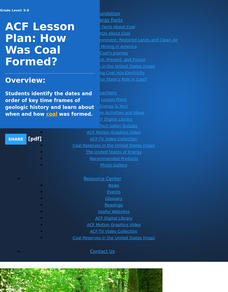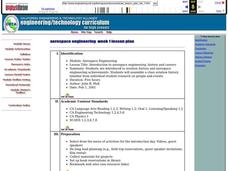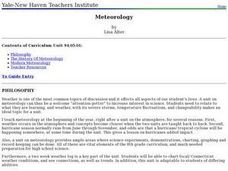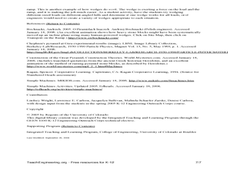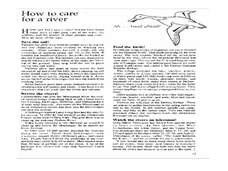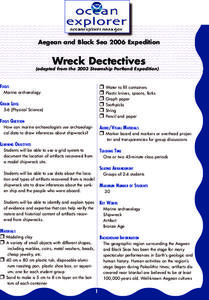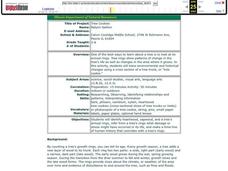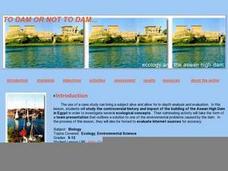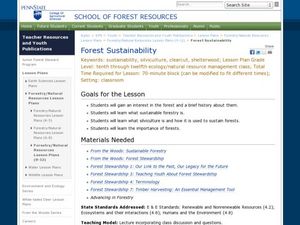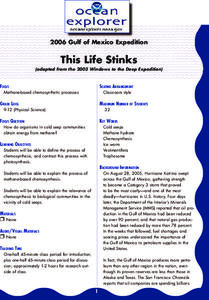Curated OER
Hippocratic Medical Rounds
A very interesting way to model Hippocrates allows your clas to to compare world views and to illustrate how ideas have changed at key times throughout the history of science. This simulation has students role play patients and physicians.
Curated OER
Urban Ecosystems 2: Why are There Cities? A Historical Perspective
Second in a series of five lessons, this lesson encourages preteens to consider cities as urban ecosystems. First, they keep a food diary for a few days. They visit the Natrional Agricultural Statistics Service website for current data...
Curated OER
How Was Coal Formed?
Geology can be a lot of fun. Learners review geology related vocabulary, make flashcards, use encyclopedias to answer questions, then explore the formation of coal. They identify dates and order them into key time frames of geologic...
Curated OER
Biotechnology
A continuous cascade of information comes through this PowerPoint on biotechnology. The topic is defined, a history is presented, and basic genetic engineering techniques are explained. The topic is covered in an objective manner,...
Curated OER
Aerospace Engineering
Students are introduced to aviation history and aerospace engineering achievements. They assemble a class aviation history timeline from individual student research on people and events.
Curated OER
Meteorology
Students research and produce an oral history that reflects the importance of meterologists in the lives of people in their community.
Curated OER
Ice Cream
Open this instructional activity by giving a brief history of ice cream. Using liquid nitrogen to lower the temperature, preteens make their own confection. The accompanying activity sheet queries learners about freezing point, the...
Curated OER
Pyramid Building: How to Use a Wedge
Students explore the simple machine of a wedge. In this wedge lesson, students test wedges on different materials including wax, soap, clay and foam. They learn how a wedge was used to build the ancient pyramid and modern day skyscrapers.
Curated OER
The Delicate Balance - Iowa's Natural Resources
Discover the natural resources in Iowa by studying it's history. In this environmental lesson, your students will observe a topographical map of Iowa and identify where its most valuable resources are. They complete an Iowa name...
Curated OER
It's not as pretty as it looks!
Tenth graders investigate that measurement is often an inact science. They explore ways utilize available information to form hypotheses. Students investigate how to test hypotheses using the HACH test kits.
Curated OER
Magnificent Microscopes Unit Including Mystery and Alternative Assessment Activity
After drawing and labelling a microscope, forensic science explorers use one to solve a simulated murder mystery. They examine each piece of evidence and draw what they observe at each magnification. Working in groups of four, your...
Curated OER
Wreck Detectives
Junior archaeologists examine types of artifacts from the Bronze Age on the internet. In collaborative groups, they create a story about a ship from this period and then construct a model of the ocean floor after their ship has sunk....
Curated OER
Genetically Modified Foods in Perspective
Students research the concept of genetically modified foods. The purpose of the research is to increase science content knowledge and comprehension of the controversy surrounding the subject.
Curated OER
Jackie Steals Home
Students draw on their previous studies of American history and culture as they analyze primary sources from Jackie Robinson and Other Baseball Highlights, 1860s - 1960s in American Memory. A close reading of two documents relating to...
Curated OER
Problem Solving in Genetic Disorders
A class of older and academically mature students are divided into pairs, usually one male and one female and are told that they are expecting a child. Unfortunately, their child may or may not have inherited some form of genetic...
Curated OER
Tree Cookies
Young scholars identify heartwood, sapwood, and a tree's annual rings, infer from a tree's rings what damage or stress might have occurred in its life, and make a time-line of human history that coincides with a tree's rings.
Curated OER
Exploring Caves
Students explain why many caves have become National Parks. They determine that caves provide shelter from enemies, and from bad weather in the summer or the winter, and provide certain mineral resources. They discover that ancient art...
Curated OER
To Dam or Not to Dam
Young ecologists explore the Aswan Dam in Egypt via the internet. Each collaborative group is assigned a specific article about the ecological impact of the dam. Then they prepare a presentation to share with the rest of the class. Some...
Curated OER
Audio Engineers: Sound Weavers
Young scholars explore audio engineering. In this career education and "sound" science lesson, students define related vocabulary and make connections between the music they listen to and the job an audio engineer does after listening to...
Curated OER
Forest Sustainability
High schoolers study major forests and their history. They see what sustainable forestry and silviculture is and discuss the topics on the attached worksheet.
Curated OER
Atomic Structure
A flashy PowerPoint includes clear summaries of atomic structure and electronic configuration. Dot and cross diagrams will help viewers learn how to draw an atom. As a result, learners should be more clear how electronic configuration...
Curated OER
Life is Weird
Separate your science class into small groups and assign each a specific deep-sea organism to research. The class will learn about all of the organisms as each group presents their assigned animal. Following their presentations, you can...
Curated OER
This Life Stinks
Chemosynthetic communities of cold seep areas are considered in this lesson. Working in collaborative groups, marine biology or oceanography learners research and prepare a report about oxidation-reduction reactions involved with...
Curated OER
The Landscape of France
Students create a nature journal for an imaginary trip around France. They Identify animals and plants that live in France and describe its landscape. In addition they research a period in France's history and prepare a brief summary of...
Other popular searches
- History of Science
- History of Science Museums
- The History of Science
- History of Science Nuclear
- History of Science Physics
- History of Science Georges
- History and Nature of Science
- History and Social Science
- History Social Science
- Ancient Science Inventions
- History and Science Fiction
- History of Forensic Science




